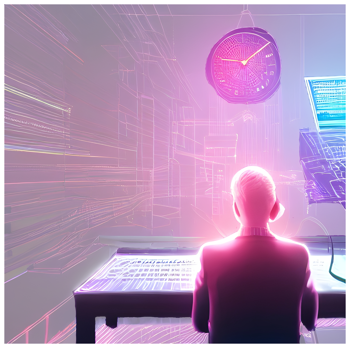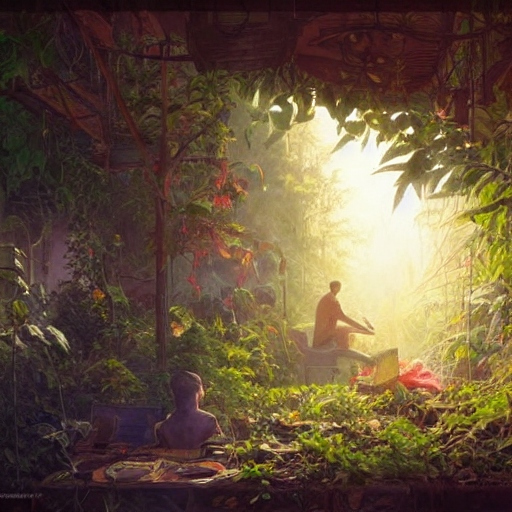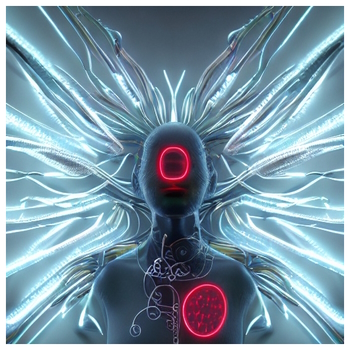Banality. I don’t often use the word, I don’t often encounter the word, and it’s largely because ‘unoriginal’ seems to work better for me. That said, one of the things I’ve encountered while I play with the new toy for me, Tumblr, used it effectively and topically:
Project Parakeet: On the Banality of A.I. writing nailed it, covering the same basic idea I have expressed repeatedly in things I’ve written, such as, “It’s All Statistics” and “AI: Standing on the Shoulders of Technology, Seeking Humanity“.
It’s heartening to know others are independently observing the same things, though I do admit I found the prose a bit more flowery than my own style:
“…What Chatbots do is scrape the Web, the library of texts already written, and learn from it how to add to the collection, which causes them to start scraping their own work in ever enlarging quantities, along with the texts produced by future humans. Both sets of documents will then degenerate. For as the adoption of AI relieves people of their verbal and mental powers and pushes them toward an echoing conformity, much as the mass adoption of map apps have abolished their senses of direction, the human writings from which the AI draws will decline in originality and quality along, ad infinitum, with their derivatives. Enmeshed, dependent, mutually enslaved, machine and man will unite their special weaknesses – lack of feeling and lack of sense – and spawn a thing of perfect lunacy, like the child of a psychopath and an idiot…”
Walter Kirn, ‘Project Parakeet: On the Banality of A.I. Writing’, Unbound, March 18th, 2023.
Yes. Walter Kirn’s writing had me re-assessing my own opinion not because I believe he’s wrong, but because I believe we are right. This morning I found it lead to at least one other important question.
Who Does Banality Appeal To?
You see, the problem here is that banality is subjective because what is original for one person is not original for the other. I have seen people look shocked when I discovered something they already knew and expressed glee. It wasn’t original for them, it was original for me. In the same token, I have written and said things that I believe are mundane to have others think it is profound.
Banality – lack of originality – is subjective.
So why would people be so enthralled with the output of these large language models(LLMs), failing a societal mirror test? Maybe because the writing that comes out of them is better than their own. It’s like Grammarly on steroids, and Grammarly doesn’t make you a better writer, it just makes you look like you are a better writer. It’s like being dishonest on your dating profile.
When I prompted different LLMs about whether the quality of education was declining, the responses were non-committal, evasive and some more flowery than others in doing so. I’d love to see a LLM say, “Well shit. I don’t know anything about that”, but instead we get what they expect we want to see. It’s like asking someone a technical question during an interview that they don’t have the answer to and they just shoot a shotgun of verbage at you, a violent emetic eruption of knowledge that doesn’t answer the question.
“I don’t know”, in my mind, is a perfectly legitimate response and tells me a lot more than having to weed through someone’s verbal or written vomit to see if they even have a clue. I’m the person who says, “I don’t know”, and if it’s interesting enough to me for whatever reason, the unspoken is, “I’ll find out”.
The LLM’s can’t find out. They’re waiting to be fed by their keepers, and their keepers have some pretty big blind spots because we, as human beings, have a lot more questions than answers. We can hide behind what we do know, but it’s what we don’t know that gives us the questions.
I’ve probably read about 10,000 books in my lifetime, give or take, at the age of 51. This is largely because I am of Generation X, and we didn’t have the flat screens children have had in previous generations. Therefore, my measure of banality, if there could be such a measure, would be higher than people who have read less – and that’s just books. There’s websites, all manner of writing on social media, the blogs I check out, etc, and those have become more refined because I have a low tolerance for banality and mediocrity.
Meanwhile, many aspire to see things as banal and mediocre. This is not elitism. This is seen when a child learns something new and expresses joy an adult looks at them in wonder, wishing that they could enjoy that originality again. We never get to go back, but we get to visit with children.
Going to bookstores used to be a true pleasure for me, but now when I look at the shelves I see less and less new, the rest a bunch of banality with nice covers. Yet books continue to sell because people don’t see that banality. My threshold for originality is higher, and in a way it’s a curse.
The Unexpected Twist
In the end, if people actually read what these things spit out, the threshold for originality should increase since after the honeymoon period is over with their LLM of choice, they’ll realize banality.
In a way, maybe it’s like watching children figure things out on their own. Some things cannot be taught, they have to be learned. Maybe the world needs this so that it can appreciate more of the true originality out there.
I’m uncertain. It’s a ray of hope in a world where marketers would have us believe in a utopian future that they have never fulfilled while dystopia creeps in quietly through the back door.
We can hope, or we can wring our hands, but one thing is certain:
We’re not putting it back in the box.














